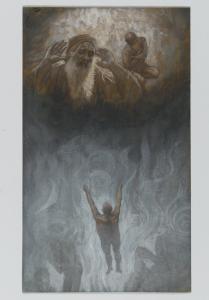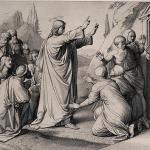Seth Kasten (see his blog) is a member of the Lutheran Church–Missouri Synod. This is one of a series of replies to his book, Against the Invocation of Saints: An Apology for the Protestant Doctrine of Prayer over and against the Doctrine of the Eastern Orthodox Church (Royal Oak, Michigan: Scholastic Lutherans, 2023). I will be using RSV for Bible passages unless otherwise noted. Words from his book will be in blue.
See other installments:
*****
Many EO will point to examples of saints in heaven praying for those on earth and assert from here that it is proper, even necessary, that we invoke them, but this does not follow. We acknowledge that the saints in heaven pray for us. This is clear in scripture and the early fathers as we have already recognized, but this does not mean we should or need to ask them for such prayers. (pp. 92-93)
As I showed in my last installment, it is entirely plausible and reasonable to suppose — given the extraordinary characteristics of saints in heaven –, that being able to hear our prayers would be included in their abilities. If departed saints are like God and like angels, and in union with God, what else is needed, pray tell, to believe that such creatures would be able to hear our prayers? Of course they can! In Revelation it even states twice that departed saints and angels in heaven have our prayers (why?!) and present them to God. And because these saints and angels are filled with sinless love for those of us on earth, they pray for us as a manifestation of that love. And they hear us, so they can know exactly how to intercede on our behalf.
Revelation 5:8 And when he had taken the scroll, the four living creatures and the twenty-four elders fell down before the Lamb, each holding a harp, and with golden bowls full of incense, which are the prayers of the saints;
In this passage, we do not know to whom these prayers belong, apart from that they are from the saints broadly speaking; that is, we do not know if the saints mentioned in 5:8 are saints in heaven or on earth. The former is certainly a possibility as we see later in chapter 6 that the saints in heaven are praying to God prayers of their own. The immediate context before 5:8 lends no help to identifying these saints. (p. 130)
This is a new one. I’ve never heard this before. “Twenty-four elders” are mentioned five times in Revelation. Commentators generally believe them to be human beings, now in heaven. The context of Revelation 5 shows that they are in heaven. 5:1 refers to God the Father “seated on the throne.” 5:6 states: between the throne and the four living creatures and among the elders, I saw a Lamb standing.” Revelation 5:7 has Jesus [“Lamb”: 5:6] taking “the scroll” from God the Father “who was seated on the throne.” Then in 5:8, “the twenty-four elders fell down before the Lamb” and in 5:9-10 they “sang a new song” which is recorded. “The throne” is again mentioned in 5:11. Absolutely every indication shows that this is taking place in heaven. How Seth can claim that “we do not know” where this scene takes place is utterly beyond my comprehension.
Revelation 4:4, 10 shows the same thing. These elders are “round the throne” (4:4) and they “fall down before him who is seated on the throne” (4:10). In Revelation 11:16 “sit on their thrones before God” [implied, before His throne]. The verse before states that “there were loud voices in heaven” and in 11:19 after the words of their worship are documented, we learn that “God’s temple in heaven was opened.” In Revelation 19:4 they worship “God who is seated on the throne” and in 19:1 St. John writes, “I heard what seemed to be the loud voice of a great multitude in heaven.”
The 6th century bishop Primascius Hadrumetum interprets this [the angel described in Revelation 8:1-5] to be Christ:
He is said to have received the same thing from the prayers of the saints, and to have offered it, because through him the process of all people can easily reach God. Hence the Apostle [writes] (Hebrews 13:15), “by Him let us continually offer the sacrifice of praise to God, that is, the fruit of our lips, giving thanks to His name.” (pp. 131-132)
He was wrong. Jesus is never identified as an angel anywhere in the New Testament. This interpretation would have it that Jesus was referred to merely as “another angel” (8:3). That’s absurd and blasphemous, since angels are created. In Hebrews Jesus is contrasted with the angels, who worship Him:
Hebrews 1:5-8 For to what angel did God ever say, “Thou art my Son, today I have begotten thee”? Or again, “I will be to him a father, and he shall be to me a son”? [6] And again, when he brings the first-born into the world, he says, “Let all God’s angels worship him.” [7] Of the angels he says, “Who makes his angels winds, and his servants flames of fire.” [8] But of the Son he says, “Thy throne, O God, is for ever and ever, the righteous scepter is the scepter of thy kingdom.”
When John saw Jesus, he saw “one like a son of man” (Rev 1:13), Who said, “Fear not, I am the first and the last” (1:17; cf. 2:8). Again when Jesus speaks to John in chapter 22 (see 22:16) He says: “I am coming soon, bringing my recompense, to repay every one for what he has done. I am the Alpha and the Omega, the first and the last, the beginning and the end” (22:12-13). Then he contrasts Himself with what He calls “my angel” (22:16). 1 Peter 3:22 states that Jesus “has gone into heaven and is at the right hand of God, with angels, authorities, and powers subject to him.”
Luke 16 is a notoriously difficult chapter to interpret. It contains the story of Lazarus and the rich man (vv. 19-31). The story is here quoted, but no doctrine of invocation can be drawn from it. (p. 134)
All kinds of things can be drawn from it. And best of all, it’s a report from Jesus’ own lips of a scene that took place in the afterlife.
A number of obstacles must be overcome for this passage to support invocation. First, it is of unclear foundation as commentators disagree on the nature of the story, whether parable or reality. (p. 135)
Parables never include proper names. So it is an actual historical account. But even if it is considered to be a parable, a parable is a teaching tool, and cannot include false theology in it, lest Jesus be guilty of error (which is impossible) and leading His followers astray (which would never happen, either). In this sense, it’s irrelevant whether it is a parable or not, so the tactic often used by those who deny the invocation and intercession of departed saints, of declaring it a parable so that what it teaches can be dismissed (as if any of Jesus’ teachings can be dismissed) falls flat.
A parable, especially when mysterious and challenging to interpret, is not strong ground for establishment of a doctrine. (p. 135)
All of Jesus’ teachings can be used to establish doctrine. For example, the parable of the sower shows that it is possible to fall away form the faith (apostasy): a thing that Calvinists deny. The parable of the wheat and the tares shows that there are sinners in the one true Church. The parable of the prodigal son shows the extraordinary lengths that God will go to forgive us and receive us into His kingdom. Hence it is a teaching about God’s nature, which is a theological doctrine.
the content of the communication between Abraham and the rich man do not match the content in EO prayers. (p. 135)
They don’t have to. All that matters is whether the story provides support for the invocation of saints. It certainly does. And the best part is that the saint involved is a very famous one, Abraham, who was known for being a great intercessor.
The communication is also from Hades to Abraham’s bosom rather than Earth to Heaven, (p. 135)
This is irrelevant, too. Lutherans and other Protestants assert that no one but God can receive a petitionary request. This story annihilates that false belief. It takes out the basic premise that Seth is defending.
and the request of the rich man is denied by Abraham rather than approved. (p. 135)
Irrelevant again. Abraham said no (Lk 16:25-26), just as God will say no to a prayer not according to His will. He asked him again, begging (16:27-28). Abraham refused again, saying (16:29): “They have Moses and the prophets; let them hear them.’” He asked a third time (16:30), and Abraham refused again, reiterating the reason why (16:31).
How this supposedly does not support the principle of saints interceding and being able to intercede and hear invocations is a mystery to me. If we were not supposed to ask saints to pray for us, I think this story would be almost the very last way to make that supposed point. Abraham would simply have said, “you shouldn’t be asking me for anything; ask God!” In the same way, analogously, angels refuse worship when it is offered, because only God can be worshiped [I cited Rev 19:9-10 and 22:8-9]. Refusing a request is not the same thing as not being able to grant the request. Otherwise, we would have to say that God is unable to answer a prayer request when He refuses one.
In this story is a guy praying to a dead man, to request things that the dead man appears to be able to fulfill (delegated to him through God’s enabling power, of course). That is quite sufficient to prove the point. But God is never mentioned in the entire story (!!!). So why did Jesus teach in this fashion? Why did He teach that the rich man asked Abraham to do things that Protestant theology would hold that only God can do? And why is the whole story about him asking Abraham for requests, rather than going directly to God and asking Him? This just isn’t how it’s supposed to be, from a Protestant perspective. All the emphases are wrong, and there are serous theological errors, which would be committed by Jesus Himself (i.e., from the erroneous Protestant perspective).
Furthermore, no command is given for invocation in this passage. (p. 135)
This is yet another non sequitur. All the catholic or Orthodox needs to prove from Holy Scripture is that there is such a thing as a proper invocation of a departed saint or angel. This passage undeniably does that, as an explicit teaching on the subject, right from our Lord Jesus, and there is no way out of it for the Protestant.
Even if it were taken as an example of invocation, the actions of the rich man are not taught as proper and should not be used as a model for Christian piety, especially considering his position in Hades. (p. 135)
Exactly! This is why Abraham turned him down, with an accompanying explanation for why he did. But this doesn’t prove that the request itself should not have been made, as explained above.
For a convenient summary of all the scriptural data that can be brought to bear on this question, see my article, Invocation Of Saints: 20 Biblical Proofs [1-15-24].
*
***
*
Practical Matters: Perhaps some of my 4,500+ free online articles (the most comprehensive “one-stop” Catholic apologetics site) or fifty-five books have helped you (by God’s grace) to decide to become Catholic or to return to the Church, or better understand some doctrines and why we believe them.
Or you may believe my work is worthy to support for the purpose of apologetics and evangelism in general. If so, please seriously consider a much-needed financial contribution. I’m always in need of more funds: especially monthly support. “The laborer is worthy of his wages” (1 Tim 5:18, NKJV). 1 December 2021 was my 20th anniversary as a full-time Catholic apologist, and February 2022 marked the 25th anniversary of my blog.
PayPal donations are the easiest: just send to my email address: [email protected]. Here’s also a second page to get to PayPal. You’ll see the term “Catholic Used Book Service”, which is my old side-business. To learn about the different methods of contributing (including Zelle), see my page: About Catholic Apologist Dave Armstrong / Donation Information. Thanks a million from the bottom of my heart!
*
***
Photo credit: The Bad Rich Man in Hell, by James Tissot (1836-1902) [public domain / Wikimedia Commons]
Summary: One of my series of replies to Lutheran Seth Kasten on the invocation of saints. I address his objections and biblical and patristic arguments against the practice.














